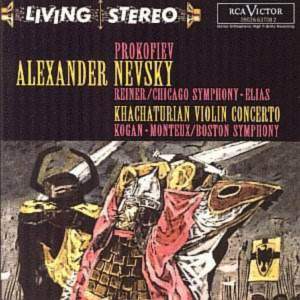The impact of the works of Prokofiev for film are immeasurable. Today's A-list
composers owe a debt, whether they're aware of it or not. James Horner and
Danny Elfman certainly seem to be. You have to wonder though if those entrenched
in modern action movie scoring appreciates where their temp scores hearken
back to.
This 1938 masterpiece has been released in several recordings of differing
approach and quality. It is the opinion of this reviewer that Prokofiev's
own cantata, which reduces it to the 7 excerpts presented here, does not
do the score full justice. It is also my opinion that this 1959 recording
is lacking on several counts too. The tempo is noticeably lackadaisical when
it ought to gallop thunderously. One thing affecting the tempo in a couple
of places is in performing the songs translated to English. The more concise
(if harsher in tone) Russian clips along jauntily. Although it may be of
intriguing curiosity value to hear, this really is a case of losing something
in the translation.
In other places, some of the weight of the material feels thinned out. "The
Crusaders in Pskov" ought to resonate at an uncomfortably low register.
Elsewhere, the early stages of Stereo show up the limitations of microphone
placement with sections of the rchestra washing across others (e.g. the
teeth-chattering xylophone during "Alexander's Entry Into Pskov").
These are however merely minor dissatisfactions with interpretation. The
music will always speak for itself.
The disc is rounded out with the first stereo recording of Khachaturian's
"Violin Concerto". After Nevsky, it's a peculiar shift in tone being
corralled into focusing on the one instrument. The piece is naturally a fantastic
showcase, and is given virtuoso life by the early days in the career of Leonid
Kogan. Like Nevsky, you can hear the occasional limitation of the
early days of stereo - like the cough during "andante sostenuto"!
Paul Tonks





